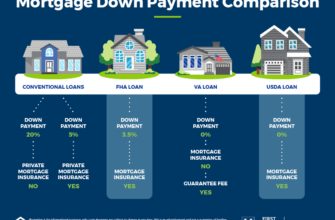When it comes to renting an apartment, many landlords and property management companies consider your credit score as an important factor in the application process. Your credit score is a reflection of your creditworthiness and is used by landlords to assess the risk of renting to you. Therefore, having a good credit score can greatly increase your chances of being approved for an apartment.
The minimum credit score required to rent an apartment varies depending on the landlord and the location of the rental property. However, in general, most landlords prefer tenants with a credit score of at least 620. This score is considered fair and indicates that you have a decent credit history. If your credit score is below this threshold, it doesn’t mean that you won’t be able to rent an apartment, but it might make the process more challenging.
Important: Having a low credit score may require you to provide additional documentation or pay a higher security deposit to compensate for the landlord’s perceived risk.
It’s important to note that landlords don’t just look at your credit score, but also take into consideration other factors such as your income, employment history, and rental history. Having a stable income and a good employment track record can help mitigate the impact of a lower credit score, as it demonstrates your ability to pay rent on time. Additionally, providing references from previous landlords who can vouch for your reliability as a tenant can also be beneficial.
If you have a low credit score, there are steps you can take to improve it before applying for an apartment. This includes paying your bills on time, reducing your debt, and disputing any errors on your credit report. Taking these actions can help boost your credit score and increase your chances of securing a rental property.
What Is a Credit Score and Why Is It Important?
A credit score is important because it is used by lenders, landlords, and other financial institutions to assess an individual’s ability to repay debts or fulfill financial obligations. A higher credit score generally indicates a lower credit risk, making it easier for individuals to borrow money, obtain loans, rent apartments, or secure better interest rates on credit cards or mortgages. On the other hand, a lower credit score may make it more difficult to access credit or result in higher interest rates and fees.
| Components of a Credit Score | Weightage |
|---|---|
| Payment History | 35% |
| Credit Utilization | 30% |
| Length of Credit History | 15% |
| New Credit | 10% |
| Credit Mix | 10% |
Key Takeaway: A credit score is a numerical representation of an individual’s creditworthiness and financial history. It is important because it impacts an individual’s ability to borrow money, obtain loans, and secure favorable credit terms. Factors like payment history, credit utilization, and credit mix contribute to the calculation of a credit score.
Understanding Credit Scores

A credit score is typically based on several factors, including payment history, credit utilization, length of credit history, types of credit used, and new credit applications. These factors are analyzed by credit bureaus, such as Experian, Equifax, and TransUnion, to generate a credit score. The most commonly used credit scoring model is the FICO score, which ranges from 300 to 850. A higher credit score indicates a lower risk of default and reflects a person’s responsible financial behavior.
Factors Affecting Credit Scores

- Payment History: Late payments or defaulting on loans can significantly lower a credit score.
- Credit Utilization: Using a high percentage of available credit can negatively impact a credit score.
- Length of Credit History: A longer credit history generally results in a higher credit score.
- Types of Credit Used: Having a mix of credit types, such as credit cards, loans, and mortgages, can have a positive impact on credit scores.
- New Credit Applications: Multiple credit applications within a short period can lower a credit score as it may indicate financial instability or high credit dependency.
Note: It is important to regularly monitor and review your credit report to ensure its accuracy and take necessary actions to improve your credit score if needed. Paying bills on time, keeping credit utilization low, and maintaining a long credit history can help improve credit scores.
| Credit Score Range | Credit Rating |
|---|---|
| 800-850 | Excellent |
| 740-799 | Very Good |
| 670-739 | Good |
| 580-669 | Fair |
| 300-579 | Poor |
Factors That Affect Credit Scores
Credit scores play a significant role in determining a person’s financial health and ability to secure loans or rent an apartment. Several factors contribute to the calculation of a credit score, and understanding these factors can help individuals take steps to improve their creditworthiness.
1. Payment History:
The payment history is one of the most critical factors affecting credit scores. Lenders and credit agencies assess whether individuals have a history of making timely payments on their debts, including credit cards, loans, and mortgages. Consistently paying bills on time can positively impact credit scores, while late payments or missed payments can have adverse effects.
2. Credit Utilization:
Credit utilization refers to the percentage of available credit that individuals use. It measures the amount of credit card debt compared to the total credit limit. High credit card balances relative to credit limits can negatively impact credit scores. Maintaining a low utilization ratio, ideally below 30%, demonstrates responsible credit management and can help improve credit scores.
3. Length of Credit History:
The length of credit history considers the age of the oldest credit account, the average age of all accounts, and the time since each account’s most recent activity. Longer credit histories provide more data for lenders to assess an individual’s creditworthiness. Individuals with longer-established credit histories generally have higher credit scores compared to those with limited or no credit history.
| Factor | Description |
|---|---|
| Types of Credit | The mix of credit accounts, including credit cards, loans, mortgages, and retail accounts. Having a diverse credit portfolio can positively impact credit scores. |
| New Credit | The number and frequency of new credit applications. Applying for multiple new credit accounts within a short period can lower credit scores temporarily. |
| Public Records | Court-related records, such as bankruptcies, judgments, liens, and collections, can substantially lower credit scores and indicate financial instability. |
Note: It’s important to regularly monitor credit reports for errors or fraudulent activities that could impact credit scores. Requesting free annual credit reports from the major credit bureaus and promptly addressing any inaccuracies can help maintain accurate credit scores.
How Credit Scores Are Calculated
- Payment history: This is the most important factor in determining a credit score. It looks at whether the individual has made their payments on time and in full. Late payments or missed payments can have a negative impact on the credit score.
- Amounts owed: This factor considers the total amount of debt an individual has, including credit cards, loans, and any other outstanding debts. It looks at the individual’s credit utilization ratio, which is the amount of credit being used compared to the total credit available.
- Length of credit history: This factor looks at the age of the individual’s credit accounts, including the age of the oldest account and the average age of all accounts. Generally, a longer credit history is seen as more favorable.
- Credit mix: This factor considers the different types of credit accounts an individual has, such as credit cards, loans, mortgages, and retail accounts. Having a mix of different types of credit can be seen as positive.
- New credit: This factor looks at the individual’s recent credit inquiries and new credit accounts. Applying for multiple new credit accounts or having multiple inquiries in a short period can have a negative impact on the credit score.
It’s important to note that different credit scoring models may weigh these factors differently. Additionally, each credit bureau may use its own proprietary algorithms to calculate credit scores. Therefore, it’s possible for an individual to have slightly different credit scores from different credit bureaus.
What Credit Score Is Needed to Rent an Apartment
The table below provides an overview of the typical credit score ranges and their corresponding implications for renting an apartment:
| Credit Score Range | Implications for Renting an Apartment |
|---|---|
| Excellent (800-850) | Highly likely to be approved for rental applications and may qualify for lower security deposits or rent rates. |
| Very Good (740-799) | Likely to be approved for rental applications with favorable terms and conditions. |
| Good (670-739) | Generally considered an acceptable credit score range for rental applications, but may have slightly higher security deposits or rent rates. |
| Fair (580-669) | Tenants with fair credit scores may face challenges in renting an apartment, and may require additional documentation or higher security deposits. |
| Poor (<580) | Individuals with poor credit scores may struggle to find a rental apartment, as landlords may be hesitant to approve their applications. |
It is important to note that credit scores are just one factor considered by landlords and property managers. They may also take into account income, rental history, employment status, and other factors when evaluating rental applications. Additionally, some landlords may be more flexible with credit score requirements for tenants who can provide a co-signer or demonstrate other forms of financial stability. Therefore, even if you have a lower credit score, it is worth applying for rental apartments and discussing your situation with the landlord to explore potential options.
The Importance of Credit Scores for Apartment Applications
- Risk Assessment: Landlords and property managers use credit scores to assess the risk associated with potential tenants. A higher credit score indicates that an individual has a history of responsible financial behavior, making them a lower risk for the landlord. On the other hand, a low credit score may signal a potential risk, as it may indicate a history of missed payments or financial instability.
- Rental Eligibility: Many landlords and property management companies set a minimum credit score requirement for applicants. This requirement helps them filter out individuals who may have a history of financial irresponsibility or may pose a higher risk of defaulting on rental payments. By setting a credit score threshold, landlords can ensure that they rent to tenants who are more likely to pay their rent on time and take care of the property.
- Negotiating Power: A good credit score can also give applicants an advantage when negotiating rental terms. Landlords may be willing to offer more favorable lease terms, such as lower security deposits or discounted rent, to tenants with higher credit scores. On the other hand, tenants with lower credit scores may face challenges in negotiating and may have to settle for less favorable terms.
How to Improve Your Credit Score

-
Pay your bills on time: Your payment history is one of the most important factors in determining your credit score. Make sure to pay all your bills, including credit card payments, loans, and utilities, on time. Late or missed payments can have a negative impact on your credit score.
-
Reduce your debt: High levels of debt can negatively affect your credit score. Consider creating a budget and finding ways to reduce your debt. Start by paying off high-interest debts first and avoid taking on new debt.
-
Keep credit utilization low: Credit utilization refers to the amount of credit you are using compared to your total credit limit. It is recommended to keep your credit utilization below 30%. If you have a high credit utilization, consider paying down your balances or increasing your credit limits.
-
Check your credit report: Regularly review your credit report for any errors or discrepancies. If you spot any inaccuracies, dispute them with the credit reporting agencies. Removing errors from your credit report can help improve your credit score.
Remember, improving your credit score takes time and consistency. By following these tips and practicing good financial habits, you can gradually increase your credit score and improve your chances of renting an apartment.
Alternative Options for Renting With a Low Credit Score
- Find a Cosigner: One option is to find a trusted friend or family member with a good credit score who is willing to cosign the lease agreement. By having a cosigner, you can mitigate the risk for the landlord and increase your chances of being approved.
- Show Proof of Stable Income: Even if your credit score is low, you can improve your chances of renting by providing proof of stable income. This can include pay stubs, employment contracts, or bank statements that demonstrate a consistent income source.
- Offer a Higher Security Deposit: Another option is to offer a higher security deposit to the landlord. By providing a larger deposit, you can give the landlord reassurance that you are committed to taking care of the property and paying rent on time.
It’s important to note that each landlord may have different criteria for approving tenants, so it’s important to communicate openly and honestly about your credit situation. Explaining any negative marks on your credit report and demonstrating your commitment to making on-time rental payments can go a long way in helping you secure a rental property.
Alternative Options for Renting With a Low Credit Score
If you have a low credit score, it can be challenging to find a rental property. However, there are alternative options available that can help you secure a place to live. Here are some alternatives for renting with a low credit score:
| Find a co-signer: | A co-signer with a good credit score can help you qualify for a rental property. They will be responsible for paying the rent if you fail to do so. |
| Show proof of income: | Provide documentation of your income, such as pay stubs or bank statements, to show landlords that you have a steady source of income and can afford the rent. |
| Offer a larger security deposit: | Increase your chances of being approved by offering to pay a larger security deposit upfront. This shows landlords that you are serious about renting and can provide a financial buffer. |
| Show rental history: | Provide references from previous landlords to demonstrate that you are a responsible tenant and have a good rental history. This can help offset a low credit score. |
| Look for rentals with no credit check: | Some landlords or property management companies may not require a credit check. Look for these types of rentals to increase your chances of being approved. |
Remember, renting with a low credit score may require more effort and flexibility on your part. Be prepared to provide additional documentation and consider these alternative options to increase your chances of finding a rental property.
FAQs
Can I rent a property with a low credit score?
Yes, even with a low credit score, you can still rent a property. There are alternative options available.
What are some alternative options for renting with a low credit score?
Some alternative options for renting with a low credit score include finding a co-signer, providing a larger security deposit, or renting from a private landlord.
How can a co-signer help me rent with a low credit score?
A co-signer is someone who agrees to take responsibility for the rent if you are unable to pay. This can give landlords more confidence in renting to you despite your low credit score.
What is a larger security deposit?
A larger security deposit is when you provide a larger amount of money upfront as a guarantee for the landlord. This can help offset any concerns they may have about your low credit score.
Why would renting from a private landlord be advantageous with a low credit score?
Private landlords may be more flexible and understanding when it comes to renting to individuals with low credit scores. They may not have as strict requirements as larger property management companies.
What is a low credit score?
A low credit score typically refers to a credit score that falls below approximately 620 on a scale of 300 to 850.









